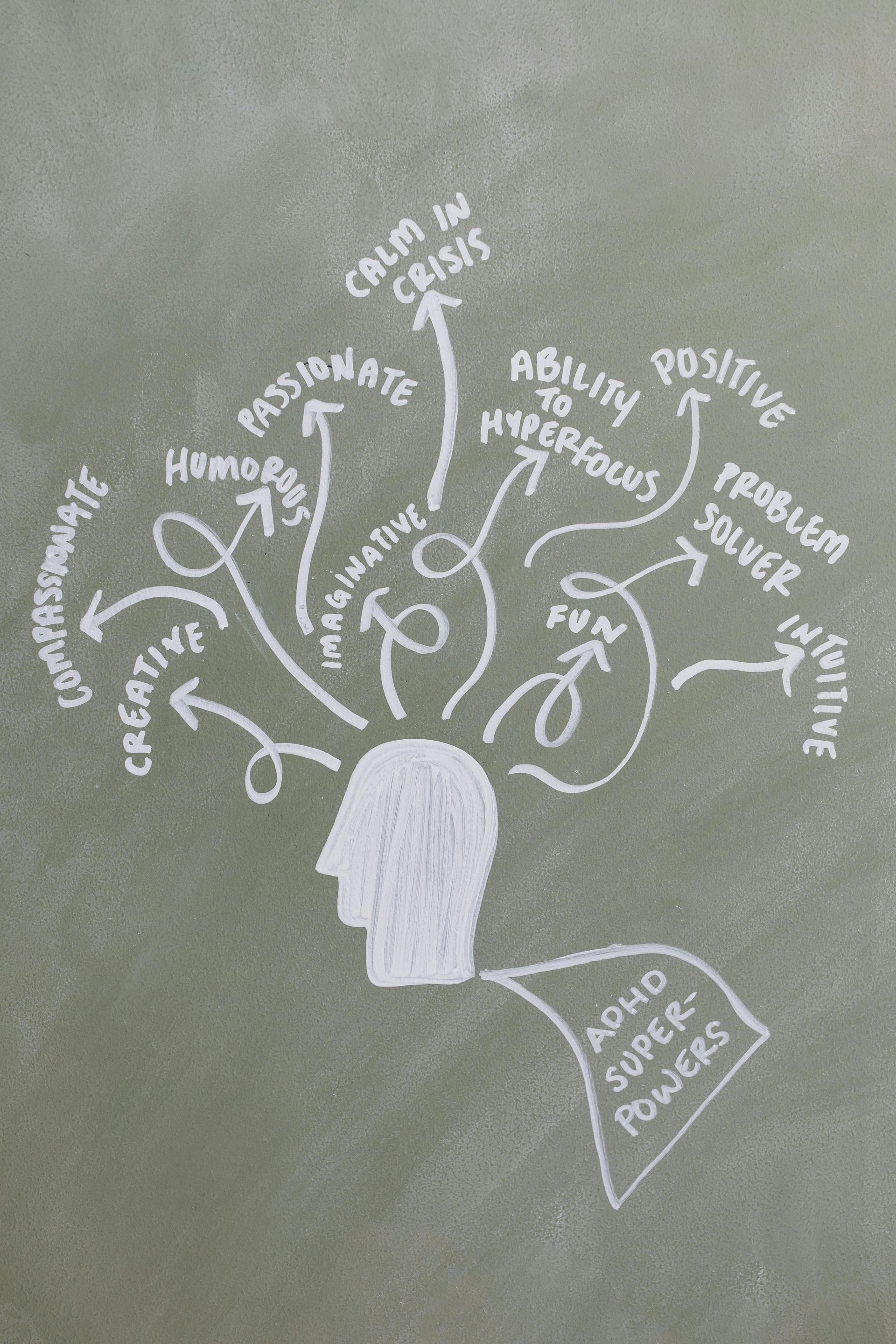
Your Mental Health Toolbox: Your repertoire of all things Mental Health
Anxiety
Understanding Anxiety Disorders: Symptoms, Impact, and Support
What Are Anxiety Disorders?
Anxiety disorders, including Generalized Anxiety Disorder (GAD), panic disorder, social anxiety, and phobias, can manifest in various ways. They affect individuals physically, emotionally, and behaviorally, often leading to overwhelming feelings of fear and worry.
When left untreated, anxiety can significantly impair work performance, strain relationships, and diminish overall quality of life. Seeking help is crucial for regaining control and improving well-being.
Reach Out for Support
Don't hesitate to connect with a mental health professional today. You are not alone in this journey.
Explore Our Services
At For You Counseling and Hypnotherapy, we offer tailored therapy sessions to help you manage anxiety and improve your mental health.
Key Symptoms
Common symptoms include restlessness, rapid heartbeat, sweating, trembling, difficulty concentrating, and sleep disturbances. Recognizing these signs is the first step toward managing anxiety effectively.
DEPRESSION
Understanding Depression: Symptoms, Impact, and Support
What is Depression?
Depression, also known as Major Depressive Disorder, is a serious mood disorder that can have profound consequences on an individual's overall well-being.
It leads to persistent feelings of sadness and a profound sense of emptiness, often accompanied by a loss of interest in activities that once brought joy or fulfillment. This debilitating condition encompasses a wide range of emotional and physical challenges.
The impact of depression can result in recurring episodes that significantly disrupt daily life, making it challenging for individuals to maintain relationships, perform at work or school, and enjoy a fulfilling life.
Key Symptoms
Common symptoms of depression encompass a range of emotional and physical experiences that can significantly impact daily life.
These symptoms often include pervasive fatigue that makes even simple tasks feel overwhelming, alongside notable changes in appetite or weight, which can manifest as either increased cravings or a total loss of interest in food.
Sleep disturbances are also prevalent, with individuals often experiencing insomnia or excessive sleeping that disrupts their normal routines.
Many who suffer from depression may struggle with feelings of worthlessness, leading to a persistent negative self-image.
Additionally, difficulty concentrating can hinder one’s ability to perform at work or engage in conversations, further exacerbating feelings of isolation.
In severe cases, these symptoms can culminate in distressing suicidal thoughts, emphasizing the critical need for support and intervention.
BIPOLAR DISORDER
Bipolar disorder is a mental health condition characterized by extreme mood swings, including episodes of mania or hypomania and periods of depression. These mood changes can last for days, weeks, or even months, significantly affecting daily life.
Symptoms of Mania
During manic episodes, individuals may experience elevated mood, increased energy, and impulsivity, leading to risky behaviors and poor decision-making.
Symptoms of Depression
In contrast, depressive episodes can bring feelings of sadness, hopelessness, and a lack of interest in activities once enjoyed, making daily functioning challenging.
Impact on Relationships
Bipolar disorder can disrupt personal relationships, strain professional life, and hinder daily activities if not properly managed, leading to isolation and frustration.
Seeking Support
It's crucial to reach out for help. Mental health professionals can provide the necessary support and treatment to manage bipolar disorder effectively.
Contact a Professional
If you or someone you know is struggling, don't hesitate to reach out. Help is available, and you don't have to face this alone.
Get Started Today
Schedule a consultation with a mental health professional to discuss your needs and explore treatment options.

Post Traumatic Stress Disorder (P.T.S.D.) / Post-Traumatic Stress Injury (P.T.S.I.)
Understanding PTSD: Symptoms, Impact, and Support


Principal Indicators.
Most common among Military and Law Enforcement Personnel, however, ANYONE can experience PTSD/PTSI !
Flashbacks, nightmares, severe anxiety, hypervigilance, avoidance, and emotional numbness are not just common indicators of post-traumatic stress disorder (PTSD); they are profound manifestations of the psychological impact that trauma can have on an individual.
These symptoms can significantly disrupt daily functioning and profoundly affect one's quality of life. For those suffering from PTSD, flashbacks may transport them back to their traumatic experiences, while nightmares can lead to restless nights filled with distressing recollections. Furthermore, severe anxiety can result in constant feelings of apprehension, leaving individuals feeling on edge.
Hypervigilance often causes those affected to be overly alert to their surroundings, perpetually scanning for potential threats. Avoidance behaviors may lead individuals to steer clear of situations or places that remind them of the trauma, further isolating them.
Lastly, emotional numbness can create a sense of disconnection from oneself and others, making it challenging to experience or express feelings. Together, these symptoms paint a complex picture of the struggles faced by individuals grappling with PTSD.
Impact on Life
PTSD can severely disrupt daily functioning and strain relationships, leading to significant emotional distress and challenges in navigating everyday life.
Individuals affected by this condition often grapple with a variety of symptoms that can manifest in numerous ways, including difficulties in concentrating, maintaining routine tasks, and engaging in meaningful social interactions.
The constant burden of anxiety and hypervigilance may further exacerbate these struggles, making even the simplest activities feel overwhelming.
As a result, it becomes increasingly essential to seek support from trained professionals who specialize in trauma, or to connect with trusted friends and family members who can offer understanding and assistance during this particularly challenging time.
Reaching out for help is not just a sign of strength; it is a crucial step towards healing and rebuilding one’s life, unlocking the path to recovery and a brighter future.
Obsessive-Compulsive Disorder (OCD)
What is OCD?
Obsessive-Compulsive Disorder (OCD) is a chronic mental health condition that is characterized by the presence of persistent and unwanted intrusive thoughts, known as obsessions, as well as repetitive behaviors or mental acts, referred to as compulsions.
These symptoms can be incredibly distressing and often lead to significant disruptions in daily functioning, making it difficult for individuals to carry out everyday tasks or engage in social interactions.
Those suffering from OCD may find themselves trapped in a cycle of anxiety and compulsion, which can take a considerable toll on their overall well-being and quality of life.
Seeking Support
Key Symptoms
Common symptoms of obsessive-compulsive disorder include persistent fears of contamination or harm, which can lead individuals to engage in excessive cleaning behaviors, checking, and counting rituals.
These compulsive routines can become so consuming that they drain significant amounts of time and energy from daily life.
As a result, individuals may find it challenging to focus on other important tasks or activities, as their thoughts are often preoccupied with their compulsions and the need to alleviate their anxiety.
Impact on Life
Attention deficit hyperactivity disorder (A.D.H.D.)
ADHD is a neurodevelopmental disorder that affects attention, hyperactivity, and impulsivity, impacting various aspects of life.

What is it?
Attention-Deficit/Hyperactivity Disorder (ADHD) is a complex neurodevelopmental condition that affects both children and adults, manifesting itself through a diverse array of symptoms that can significantly impact daily life.
Individuals with ADHD may experience considerable difficulty focusing on tasks, which often leads to challenges in academic and professional settings where sustained attention is crucial for success.
Additionally, forgetfulness can become a common issue for these individuals, causing disruptions in their daily activities and responsibilities, as they may struggle to remember important commitments or deadlines.
Many individuals with ADHD also grapple with feelings of restlessness, finding it particularly difficult to remain still or calm in situations that require prolonged focus and concentration. Impulsivity is another hallmark symptom of this disorder, often resulting in hasty decisions or actions taken without fully considering the potential consequences, which can add to the challenges faced in social and professional environments.
Furthermore, poor time management can complicate their ability to effectively organize tasks, prioritize responsibilities, and meet deadlines, leading to increased stress and feelings of being overwhelmed. So, what exactly is ADHD, and how does it influence the lives of those affected by it?
Impact on Life
ADHD can significantly affect various aspects of an individual's life, including academic performance, work productivity, and interpersonal relationships.
Individuals diagnosed with ADHD often face persistent challenges in maintaining focus, managing their time effectively, and organizing their tasks, which can lead to substantial difficulties in both educational settings and professional environments.
These struggles may result in incomplete assignments, missed deadlines, and an inability to fully engage in collaborative projects, all of which contribute to increased stress and frustration.
Consequently, these challenges can ultimately have a profound impact on a person's self-esteem and their ability to interact socially, making support from family members, friends, and professionals absolutely essential for successfully navigating these complex difficulties.
By providing the right resources, understanding, and encouragement, it becomes possible for individuals with ADHD to develop effective coping strategies that empower them to thrive and succeed in both their personal and professional lives.
Through tailored interventions and a supportive network, they can unlock their full potential and foster meaningful connections with those around them.
Schizophrenia
Key Symptoms
Daily Impact
Professional Support
Telehealth Services
Eating Disorders

What Are Eating Disorders?
Eating disorders are serious medical conditions that involve unhealthy relationships with food, weight, and self-image. These complex psychological issues can manifest in various forms, including anorexia, bulimia, and binge eating disorder. Importantly, they can affect individuals from all walks of life; regardless of age, gender, socioeconomic status, or cultural background, anyone can struggle with disordered eating behaviors. The impact of these disorders extends beyond physical health, often affecting emotional well-being and social interactions as well.
Recognizing the Symptoms
Key symptoms of eating disorders include extreme dieting, binge eating, purging, and obsessive thoughts about weight and body shape. Individuals struggling with these issues often find themselves trapped in a cycle of unhealthy behaviors that can have serious physical and emotional repercussions. Recognizing these symptoms is crucial, as awareness serves as the vital first step towards recovery and a healthier relationship with food and body image. Taking the time to acknowledge these challenges can open the door to seeking help and support, ultimately leading to a more balanced and fulfilling life.
Borderline Personality Disorder (BPD)

What is BPD?
Borderline Personality Disorder (BPD) is a complex mental health condition characterized by notable instability in various aspects of life, including moods, self-image, and interpersonal relationships.
Those who live with BPD often find themselves experiencing intense emotional fluctuations that can be overwhelming and difficult to manage.
This emotional turbulence can lead to significant challenges in maintaining stable and healthy relationships, as individuals may swing between idealizing others and feeling extreme disappointment.
Consequently, navigating daily life can be particularly challenging, as the struggle for emotional balance often permeates many aspects of their existence.
Impact of BPD
Borderline Personality Disorder (BPD) can manifest in various challenging behaviors, leading to tragic consequences such as self-harm, suicidal tendencies, and significant difficulties in maintaining healthy relationships.
These distressing outcomes can create a tumultuous environment not only for those suffering from the disorder but also for their families and friends.
Understanding the profound impacts of BPD is crucial for both individuals experiencing these symptoms and their loved ones, as it fosters compassion, better support systems, and effective coping strategies to navigate the complexities of this condition.
Key Symptoms
Common symptoms of Borderline Personality Disorder (BPD) include a profound fear of abandonment, impulsivity that can lead to risky behaviors, intense mood swings that may shift rapidly, and unstable relationships that often result in turmoil.
These symptoms can significantly impact an individual's daily life, making it challenging to maintain personal and professional relationships, and they can seriously affect emotional well-being.
The constant struggle with these symptoms can lead to feelings of emptiness and confusion, further complicating the ability to navigate everyday situations and interactions.
Seeking Support
If you or someone you know is struggling with Borderline Personality Disorder (BPD), it’s important to understand that reaching out to a qualified mental health professional can provide essential support and guidance during these challenging times.
These experts are trained to help individuals navigate the complexities of BPD and develop healthier coping strategies. Remember, help is available, and taking that first step toward assistance can lead to significant improvements in emotional well-being and overall quality of life.
Autism Spectrum Disorder

Key Symptoms of ASD
Individuals with Autism Spectrum Disorder (ASD) may encounter a variety of challenges in their daily lives, particularly when it comes to interpreting social cues and interacting with others.
They often struggle to understand the subtle nuances of communication, such as body language and tone of voice. Additionally, many may engage in repetitive behaviors—such as hand-flapping or rocking—as a means of self-soothing or coping with anxiety.
Sensory sensitivities can also play a significant role, as they might find certain sounds, lights, or textures overwhelming.
Furthermore, those with ASD often have restricted interests, intensely focusing on specific topics or activities, which can lead to a deeper knowledge and passion in those areas.
Impact of ASD
ASD, or Autism Spectrum Disorder, can significantly affect various aspects of an individual’s life, including their learning capabilities, communication skills, and daily functioning.
These challenges can present obstacles that impact not only the individual but also their families and communities. However, it is crucial to recognize that early intervention can make a substantial difference.
When support and resources are provided at a young age, it can lead to improved developmental outcomes and a better overall quality of life for those affected by the disorder.
Early intervention strategies can help in building essential skills that foster independence and social engagement, paving the way for a brighter future.
Substance Use Disorders:
Substance use disorders are complex conditions characterized by the misuse of drugs or alcohol, leading to addiction and significant impairment in daily functioning. Recognizing the signs and understanding the impact can pave the way for recovery.

Key Symptoms
Common indicators of substance use disorders include intense cravings that can be difficult to resist, withdrawal symptoms that may arise when the substance is not available, and a marked loss of control over one’s ability to manage substance use.
Additionally, individuals may continue to use the substance even when faced with serious negative consequences, such as health issues, strained relationships, or legal problems.
These signs collectively highlight the challenges that individuals may encounter as they struggle with their substance use.
Health Impact
Substance use disorders can lead to a wide range of severe health issues, including physical ailments like liver disease, heart problems, and mental health disorders such as anxiety and depression.
Beyond the individual health complications, these disorders can also result in strained relationships with family and friends, as loved ones may feel the emotional toll of the addiction.
Furthermore, individuals struggling with substance use may face significant legal or financial troubles, including arrests, loss of employment, and mounting debts.
The consequences of these challenges not only impact the individual but also extend to their loved ones, creating a ripple effect that can disrupt the entire family unit and community.
Regular Therapy Sessions
Engage in tailored evidence-based interventions that are specifically designed to meet your unique needs and circumstances.
These interventions will be complemented by ongoing progress monitoring to ensure that your development is tracked accurately, allowing for timely adjustments and enhancements as necessary.
This personalized approach not only focuses on effective strategies but also emphasizes consistent evaluation to optimize your outcomes.
Support and Recovery
Seeking help is crucial for anyone facing mental health challenges.
Support from qualified mental health professionals can provide invaluable guidance on an individual's journey to recovery.
These experts not only offer hope but also equip clients with effective strategies to navigate their difficulties.
By fostering a supportive environment, mental health professionals help individuals develop coping skills and resilience, paving the way for a brighter and healthier future.

Panic Disorder:
Panic disorder is an anxiety disorder characterized by recurrent panic attacks and an overwhelming fear of future attacks. These sudden episodes of intense fear can lead to significant distress and disruption in daily life.

Key Symptoms
Common symptoms of serious medical conditions often include chest pain, shortness of breath, dizziness, and a profound sense of impending doom that can be overwhelming.
It is essential to recognize these warning signs early, as they can indicate the need for immediate medical attention.
Understanding and acknowledging these symptoms can be crucial for seeking help quickly, potentially preventing more severe health issues from developing and ensuring proper care is provided in a timely manner.
Seeking Support
If you or someone you know is struggling with panic disorder, reaching out to a mental health professional can be a vital step. Relief is possible.
Impact on Daily Life
Panic disorder often leads to a range of avoidance behaviors, where individuals may consciously or unconsciously steer clear of situations that could potentially trigger an attack.
This pattern of avoidance can significantly impact various areas of life, including personal relationships, social interactions, and professional responsibilities.
Consequently, individuals may find themselves missing out on important events, opportunities for growth, and meaningful connections, further exacerbating feelings of isolation and anxiety.
The ripple effect of these avoidance behaviors can create a cycle that is difficult to break, making it essential for individuals to seek support and effective coping strategies.
